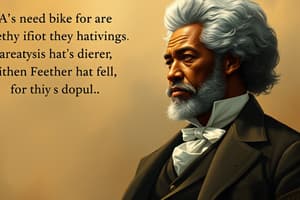Podcast
Questions and Answers
What are two reasons why Frederick cannot relate his name of escape?
What are two reasons why Frederick cannot relate his name of escape?
He doesn't want to embarrass others and induce greater vigilance among slaveholders.
What is his opinion of the underground railway?
What is his opinion of the underground railway?
He hates it because it makes owners be more watchful.
What does Frederick ask of Master Thomas and what is he told?
What does Frederick ask of Master Thomas and what is he told?
He asks if he can hire people to work under him and Master Thomas says no, it's just another strategy of escape.
Why does Frederick agree to an arrangement with Master Hugh that benefits the Master?
Why does Frederick agree to an arrangement with Master Hugh that benefits the Master?
How is the agreement between Frederick and Master Hugh dissolved?
How is the agreement between Frederick and Master Hugh dissolved?
When and to where does Frederick run away, and what is his attitude about it now?
When and to where does Frederick run away, and what is his attitude about it now?
How was it possible for Frederick and Anna to marry, and why is their marriage such an important event?
How was it possible for Frederick and Anna to marry, and why is their marriage such an important event?
Why doesn't Frederick stay in New York?
Why doesn't Frederick stay in New York?
Why did Frederick change his name so much, and who chooses Douglass?
Why did Frederick change his name so much, and who chooses Douglass?
What had Douglass believed about life in the North and was he correct?
What had Douglass believed about life in the North and was he correct?
What does Douglass discover about prejudice against color in New Bedford?
What does Douglass discover about prejudice against color in New Bedford?
What work does Douglass find?
What work does Douglass find?
Why is Douglass at first reluctant to speak out against slavery?
Why is Douglass at first reluctant to speak out against slavery?
Flashcards are hidden until you start studying
Study Notes
Frederick Douglass Overview
- Frederick Douglass refrains from sharing his escape narrative to avoid causing embarrassment to others and to prevent heightened vigilance from slaveholders.
- He holds a negative view of the Underground Railroad, believing it makes slave owners more alert and watchful.
Interactions with Masters
- Douglass inquires about hiring workers from Master Thomas, who denies this request, perceiving it as a potential escape tactic.
- He agrees to an arrangement with Master Hugh that ultimately benefits the Master, allowing him to hire individuals as a form of escape.
Agreement and Consequences
- The arrangement with Master Hugh dissolves when Douglass fails to pay the required $3 at the week's end and does not acquire his own equipment, leading to penalties.
Escape to Freedom
- Douglass escapes on September 3, 1838, arriving in New York; initial excitement is overshadowed by feelings of loneliness.
Marriage and Importance
- Douglass marries Anna, a free woman, which is significant due to her status and the participation of a reverend, marking an important milestone in his life.
Safety Concerns
- Douglass does not remain in New York long due to safety concerns and the threat of being recaptured.
Name Changes
- He frequently changes his name due to new owners and the commonality of the surname Johnson; Mr. Nathan Johnson ultimately names him Douglass, inspired by literature he recently read.
Perceptions of the North
- Douglass enters the North with the belief that it would be a place of cleanliness and prosperity, but discovers the harsh realities that contradicted his expectations.
Prejudice Experienced
- In New Bedford, Douglass observes discrimination between free Blacks and fugitive slaves, with the former sometimes betraying the latter; white co-workers refuse to collaborate with Black laborers.
Employment Experiences
- His first job involves stowing oil on a sloop, a task that starts his working life in the North.
Reluctance to Speak
- Initially, Douglass hesitates to voice his opposition to slavery as he feels inadequately matched against those who articulate the cause better and is burdened by the prospect of addressing a white audience.
Studying That Suits You
Use AI to generate personalized quizzes and flashcards to suit your learning preferences.




